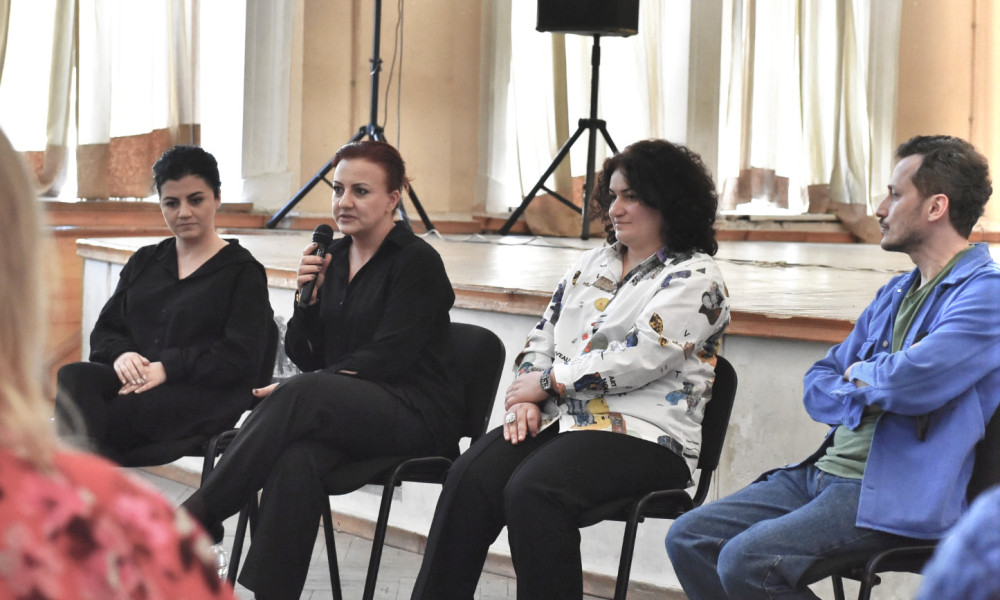What is the role of contemporary Armenian literature in the regional and global map? With this question a few weeks ago Kutaisi — a UNESCO City of Literature since 2023 — hosted the second phase of the annual Re-Lentus project, aimed at fostering Armenian-Georgian cultural dialogue. This year the theme of the initiative was literature, focusing on exploring shared issues, common ground for the dialogue, characteristics, similarities, and differences between contemporary Armenian and Georgian literature.
Within the framework of the project, the recent literary developments of Armenia were presented by three female experts: writer, cultural journalist, editor, and producer Anush Kocharyan, literary agent and founder of the “ARI Literature Foundation” and "ARI Literary and Talent Agency" Arevik Ashkharoyan and a translator, orientalist, and Georgian language professor Asya Darbinyan. The concluding event, held in the format of a panel discussion, commenced with opening speeches of the organisers — representatives of the CuMa Lab (Georgia) and the CSN Lab (Armenia). Tamar Janashia addressed the selection process for this year's theme and the significance of hosting the Georgian phase of Re-Lentus in Kutaisi. Tigran Amiryan and Mariam Yeghiazaryan emphasized the importance of fostering Armenian-Georgian cultural dialogue, the vitality of supporting female cultural practitioners, shared insights into the collaboration between CSN and CuMa Lab, and provided an overview of the concept and objectives of the Re-Lentus project. Aside from the Georgian public, delegates from the "Danish Cultural Institute" (DCI) were among the attendees of the event.
The opening speeches were followed by the panel discussion moderated by the playwright, author and translator Davit Gabunia. The conversation began with exploring the role of contemporary Armenian literature within the broader context of world literature, seeking to touch upon the themes, subjects, and narratives that are central to the books of modern Armenian writers. Writer Anush Kocharyan talked about the thematic complexity of her writings, as well as the deep cultural, historical and political context which often serves as the foundation for contemporary Armenian literature. "Sometimes it seems to me that my texts could not be translated," remarked Anush Kocharyan, expressing her concern about the challenges of translating literature rooted in the local context and historical narratives, which may be incomprehensible and untranslatable for the international reading community.
Thereafter, literary agent Arevik Ashkharoyan, drawing upon her professional expertise, emphasized Armenian authors whose works have been translated into various languages and who actively participate in different international literary festivals. In addition, Ashkharoyan underlined the obstacles hindering the promotion of Armenian literature, particularly noting Armenia's limited engagement in literary festivals, the low involvement of Armenian authors in exchange programs, and the challenges associated with translation.
Davit Gabunia then brought up the matter of Armenian-Georgian literary dialogue, highlighting the literary past of both countries and questioning their current situation and prospects. Translator Asya Darbinyan discussed the barriers between Armenian and Georgian societies, as well as the challenges stemming from a lack of knowledge and mutual recognition. She particularly underscored the importance of translating and exchanging contemporary literature between the two countries, underlining that direct dialogue is essential for fostering mutual interaction and collaboration. Asya also mentioned her current projects, upcoming translations, and the lack of Armenian-Georgian translators in both countries, as a result of which the translation of literature from these countries falls on the shoulders of a few dedicated translators.
Answering the final question, "Which contemporary authors or literary pieces would you advise reading?" Anush, Arevik, and Asya highlighted several authors and compositions. They particularly emphasized the works of Aram Pachyan, Susanna Harutyunyan, Armen from Armenia(Ohanyan) and Anna Davtyan.
After the panel discussion, a Q&A session followed, focusing on the gender dimensions of Armenian literature, including its representations of femininity and masculinity, and addressing the challenges and difficulties encountered by female writers. The event concluded with Tigran Amirya's closing remarks, wherein he underscored the thematic development of modern Armenian literature, highlighting its tendencies toward liberation and democratization.
Re-Lentus annual cultural project is implemented by the CSN Lab (Armenia) and CuMaLab (Georgia) with the support of the Danish Cultural Institute (DCI) within the New Democracy Fund (NDF) programme.

